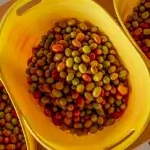Finally! Warm weather has arrived in West Michigan. After a few nail-biter nights in late May, including some with frost in the lower areas of the farm, we have finally been able to plant the remaining cold-sensitive crops on both farms.
Knowing that hot air lifts a balloon off the ground, cold air will do the opposite. Cooler air settles and even flows like a river following the topography of the land. Settling in lower areas or pockets, once below 32 degrees, frost will begin to form on plants. We can protect crops by covering them with something as simple as a bucket or even a sheet. Water sprinklers work well or even a fan.
Frost aside, we have just all experienced the driest May in nearly 100 years. This brings the farmer yet another thing to lose sleep over. Irrigation is an essential lifeline to our farm. Vegetables prefer around two inches of water each week for maximum growth and yield, which can be very challenging when Mother Nature doesn’t lend a hand. Sprinklers can only do so much, as large amounts of this water evaporate daily.
One way we have adapted to this issue is through drip irrigation. “Drip tape” is run down each field row connected to a main line water source. This tape has small holes every 12 inches, delivering a slow trickle of water directly to the plant’s roots. Drip irrigation allows for us to use less water more precisely, which is great for a few reasons:
- It allows us to water only the crops, and not the surrounding weeds as overhead sprinkling does.
- This also lowers the risk of diseases caused by wet foliage during the nighttime when things like fungi thrive.
- Drip irrigation uses up to 70% less water than traditional sprinkling, it lowers risk of disease, and increases yields.
This may not be such a big deal here in the Great Lakes State, but to other states where water is a scarce resource, drip irrigation can be a game changer. If this dry weather continues, the Grow Team promises to keep the water flowing here at the Kids’ Food Basket farms.
As always, thank you to everyone who joins us on the field to pitch in! Volunteer shifts are open most weekday mornings on our farms in Kent and Ottawa counties. We look forward to spending the summer making memories and food with our awesome community of volunteers.
Have a safe and fun start to your summer!
Warmly,
Jason, Sara and Zack (KFB Grow Team)



